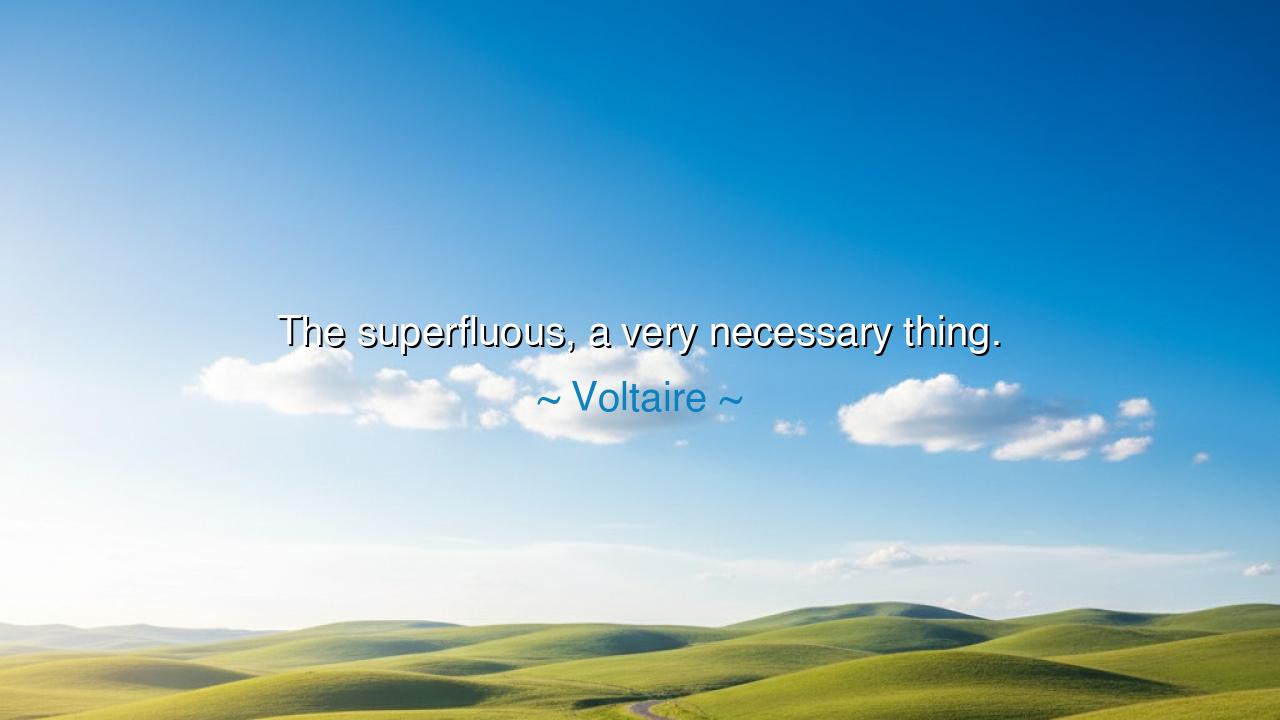
The superfluous, a very necessary thing.






In the grand unfolding of life, there are moments when a simple statement contains within it the depth of human experience—when words speak not only of what is visible but of the unseen forces that guide us. Voltaire, the great French philosopher, captured this truth when he proclaimed, "The superfluous, a very necessary thing." At first glance, this may seem like a paradox, a contradiction within itself. How can something unnecessary, by its very nature, be deemed necessary? But within these words lies a profound reflection on the nature of humanity, desire, and the pursuit of meaning.
To understand this paradox, we must first turn to the teachings of the ancients. The Greeks understood the balance between necessity and excess—they prized moderation as the key to a life well-lived. Aristotle, in his Nicomachean Ethics, spoke of the golden mean, the path between extremes, where true happiness and virtue lay. Yet, even in their pursuit of moderation, the Greeks understood that luxury and pleasure had a place in human existence. They were not viewed as evil or harmful, but as aspects of life that, when embraced with balance, could enhance the human experience. The superfluous, then, was not an indulgence to be feared or discarded but a part of the complexity of life.
In the Roman Empire, there was the story of Emperor Augustus, whose reign was marked by both order and opulence. While he was known for bringing stability and reform to Rome, he also indulged in the luxuries of power—extravagant feasts, ornate palaces, and public games. Yet, his extravagance was not seen as frivolous; it served to unite the people, to create a sense of glory and prestige for the Roman Empire. Just as Augustus recognized the importance of luxury as a tool for governance, Voltaire’s words remind us that the superfluous, in its right place, has the power to enrich and uplift the human spirit. Excess, when aligned with purpose, can be a force for good.
Similarly, in the Renaissance, Leonardo da Vinci exemplified the tension between the necessary and the superfluous. As a scientist, engineer, and artist, da Vinci sought knowledge in both the practical and the imaginative. His inventions were grounded in reason, yet his art was a celebration of beauty—an embrace of the superfluous as a reflection of the divine. In his famous works, such as the Mona Lisa and The Last Supper, da Vinci infused his subjects with grace, light, and detail that transcended the merely functional. In this, we see the truth of Voltaire’s observation: that the superfluous—when it is used to inspire, to elevate, and to move the soul—becomes not a burden, but a necessity for the full expression of human creativity.
Yet, even as we recognize the value of the superfluous, we must also heed the ancient cautionary tales of excess. The Romans knew well the dangers of indulgence. Caligula, one of the most infamous emperors of Rome, was a man who lived to excess, indulging in lavish parties, cruel games, and extravagant spending. His life became a cautionary tale of how the superfluous, when unbridled and disconnected from any higher purpose, can lead to ruin. Similarly, in the tale of Nero, we see a ruler whose excessive desires for pleasure and glory ultimately led to the fall of his empire. Here, Voltaire’s wisdom comes into sharp focus: while the superfluous can enhance life, it must be tempered by wisdom, moderation, and a sense of purpose.
The lesson that Voltaire imparts is one of balance and reflection. In our own lives, we must recognize the value of both necessity and the superfluous—the balance between the practical and the indulgent. There is a time for work and duty, but there is also a time to embrace the pleasures that life offers, to experience the beauty and joy that can inspire and uplift the spirit. It is in the wise use of the superfluous, not in its rejection, that we find the fullness of life. Just as the ancient philosophers taught us that the good life is one of balance, so must we learn to embrace both the necessary and the excessive, ensuring that our indulgences serve to enrich rather than distract.
As we move through life, let us not shy away from the superfluous—the art, the beauty, the joy that may seem unnecessary but is, in fact, essential for a life fully lived. Like the great figures of the past, we must learn to balance the practical with the pleasurable, recognizing that sometimes the extravagant is not a waste but a source of inspiration, creativity, and meaning. Let us embrace the superfluous, not as a sign of excess, but as a necessary part of the human journey—one that adds color and depth to the canvas of our lives.






AAdministratorAdministrator
Welcome, honored guests. Please leave a comment, we will respond soon